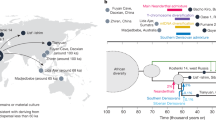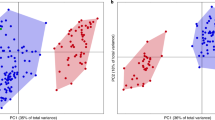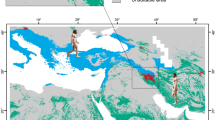Abstract
THE recent communication by Miss Garrod1 concerning discoveries of human remains in Palestine raises questions of such wide and general interest, and bears so directly on work in which we have been engaged, that we venture to put forward the following views as to a possible line along which a synthesis may be made of the complicated evidence so far obtained relating to the fossil history of the human family.
This is a preview of subscription content, access via your institution
Access options
Subscribe to this journal
Receive 51 print issues and online access
$199.00 per year
only $3.90 per issue
Buy this article
- Purchase on SpringerLink
- Instant access to full article PDF
Prices may be subject to local taxes which are calculated during checkout
Similar content being viewed by others
References
Garrod, D., Times, June 11, 1932.
Bolk, L., Lancet, Sept. 10, 1921; Proc. Konin. Akad. v. Wetensch. te Amsterdam, 25, 1922; "Das Problem der Menschwerdung", Jena, 1926
Keith, A., NATURE, Supplement, Aug. 18, 1923.
Beer, G. R. de, "Embryology and Evolution.", Oxford, 1930.
Hrdlička, A., J. Roy. Anthrop. Inst., 57, 1927.
Author information
Authors and Affiliations
Rights and permissions
About this article
Cite this article
BUXTON, L., DE BEER, G. Neanderthal and Modern Man. Nature 129, 940–941 (1932). https://doi.org/10.1038/129940a0
Issue date:
DOI: https://doi.org/10.1038/129940a0



